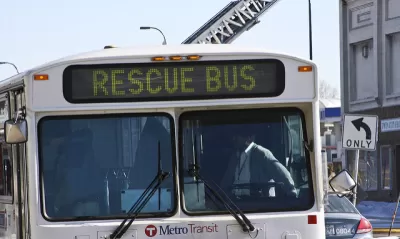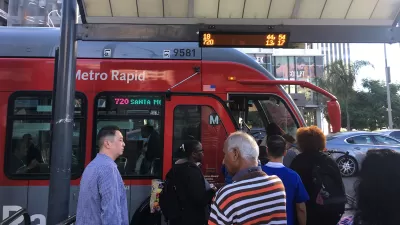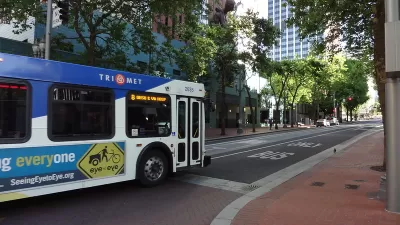While transit systems around the country had reason to celebrate the new funding made available in the federal infrastructure bill, long-term concerns about operational capacity have not been resolved.

"[The Detroit Department of Transportation] is making changes to routes across the city this week in an effort to improve service and reduce bus stop wait times," reports Eric D. Lawrence for Detroit Free Press.
C. Mikel Oglesby, Detroit's executive director of transit, is quoted in the article saying that the new schedules more accurately reflect the service currently provided, as the system "grapples with low ridership and a bus driver shortage." To minimize the inconvenience to riders, DDOT is targeting service reductions on low-ridership routes.
" [Oglesby] said DDOT is short about 90 drivers and ridership is down about 50%, from about 70,000 per day to 30,000-35,000 per day," reports Lawrence.
Bus driver shortages pre-date the pandemic—cities like St. Louis, Denver, and Minneapolis made news for cutting trips due to driver shortages in 2019, for example—but the problem has been perpetuated by the pandemic. MARTA also recently cut bus service in the Atlanta region, also citing bus driver shortages as the reason for the cutbacks.
In some respects, public transit seems to be prospering through the pandemic: Stimulus funding prevented the existential crises of Spring 2020, record amounts of new funding has been made available by the recently approved Infrastructure Investment and Jobs Act (IIJA), and a growing number of transit systems lowering or eliminating fares.
Despite those reasons for optimism, transit systems are still hanging by a thread (as reported on this site earlier in 2021): Ridership has been slow to return to most U.S. transit systems, the aforementioned driver shortages persist, and the IIJA also provided a record amount of funding for automobile infrastructure.
Most significantly to the future of public transit systems like the DDOT's, the structural deficit of transit funding for public transit operations in this country has not been resolved.
FULL STORY: DDOT to make route changes after low ridership, bus driver shortage

Manufactured Crisis: Losing the Nation’s Largest Source of Unsubsidized Affordable Housing
Manufactured housing communities have long been an affordable housing option for millions of people living in the U.S., but that affordability is disappearing rapidly. How did we get here?

Americans May Be Stuck — But Why?
Americans are moving a lot less than they once did, and that is a problem. While Yoni Applebaum, in his highly-publicized article Stuck, gets the reasons badly wrong, it's still important to ask: why are we moving so much less than before?

Using Old Oil and Gas Wells for Green Energy Storage
Penn State researchers have found that repurposing abandoned oil and gas wells for geothermal-assisted compressed-air energy storage can boost efficiency, reduce environmental risks, and support clean energy and job transitions.

Greening Oakland’s School Grounds
With help from community partners like the Trust for Public Land, Oakland Unified School District is turning barren, asphalt-covered schoolyards into vibrant, green spaces that support outdoor learning, play, and student well-being.

California Governor Suspends CEQA Reviews for Utilities in Fire Areas
Utility restoration efforts in areas affected by the January wildfires in Los Angeles will be exempt from environmental regulations to speed up the rebuilding of essential infrastructure.

Native American Communities Prepare to Lead on Environmental Stewardship
In the face of federal threats to public lands and conservation efforts, indigenous groups continue to model nature-centered conservation efforts.
Urban Design for Planners 1: Software Tools
This six-course series explores essential urban design concepts using open source software and equips planners with the tools they need to participate fully in the urban design process.
Planning for Universal Design
Learn the tools for implementing Universal Design in planning regulations.
Heyer Gruel & Associates PA
City of Moreno Valley
Institute for Housing and Urban Development Studies (IHS)
City of Grandview
Harvard GSD Executive Education
Salt Lake City
NYU Wagner Graduate School of Public Service
City of Cambridge, Maryland




























